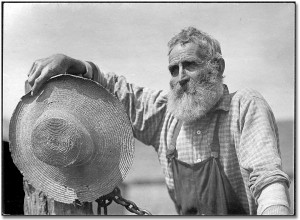 This short story is based on my memories of an uncle of mine; on a reminiscence by my dad about his growing-up years, just at the time this story takes place; and on my memories of my own life. But I’m not going to tell you which is which!
This short story is based on my memories of an uncle of mine; on a reminiscence by my dad about his growing-up years, just at the time this story takes place; and on my memories of my own life. But I’m not going to tell you which is which!
——
“Here comes old man Schutte! Guess it’s the Center Grove Methodist’s turn this Sunday,” said Hilda Cain, looking across the church yard as she stood by the “dinner on the ground” tables set up for the church’s weekly post-service feed. Lizzie Duncan, standing beside her, nodded. “You’d think he’d get tired of making this endless round to a different church in the county every Sunday, wouldn’t you now?”
“Old Man Schutte” was actually named Jacob. He was a 70-ish bachelor farmer in this early 1900’s scene, his mouth all set and watering for his only decent, home-cooked meal of the week. Fried chicken, roast beef, mashed potatoes, butter beans, potato salad, yummy chocolate pie, luscious layer cakes — all the trimmings of a Sunday dinner in those days when more Americans lived on farms then in towns. Jacob dreamed of these and other delicacies every Saturday night. While he could cook well enough at home for his needs, no meal tasted even close to those his mom used to fix, except those “dinner on the ground” church meals.
Jacob was different — that was for certain. He had stayed single and on his own in those days when the vast majority of people just routinely expected to commit matrimony — to some pretty maiden or stalwart young man — at least by their early 20s. Often younger than that, if they were farmers. Needed a lot of hands to run that farm in those days, they did. Families of eight or 10 children, or even more, were common. But the farmer and his wife didn’t have to troop to a mom and pop grocery store weekly to lay in a bunch of provender — on the cuff — as city folks did. They raised most of their own food; vegetables, fruits, cattle, hogs, and, of course, chickens. People nowadays are stunned to hear that a family they know has four or five children — but the circumstances back then were a lot different, folks.
That was another way Jacob differed from most in the early 1900s. He was an only child. An older brother had been born the year after his parents married, but the boy caught a fever shortly after birth and lived only 10 days. A few years later, Jacob came along; strong and healthy from the day of his birth. But as an only son in a farm family, he learned early on about the unceasing labor required from those who till the soil. And no more children followed Jacob. Whatever the reason was, his parents never offered to tell him. And Jacob, being somewhat reticent just like his folks, didn’t ask. There was work to do, every day, son, and we’ve gotta get to it!
Jacob was different in other ways, too. He had lost three fingers on his left hand in an accident with one of their farm implements, years ago, when his parents were still living and he and his dad worked the Schutte farm. Of course, that wasn’t unusual in those days, either. Farm machinery cou ld be dangerous. Jacob didn’t let that slow him down, though. After recuperating at home for a short time, with Mom tending to him, he went right back to the fields with Pop. A man had to work for his living in those days, and a family farm had to be tended, every day. The word “disability” would have brought a puzzled frown, instead of a knowing nod, to heads in Theodore Roosevelt’s day.
ld be dangerous. Jacob didn’t let that slow him down, though. After recuperating at home for a short time, with Mom tending to him, he went right back to the fields with Pop. A man had to work for his living in those days, and a family farm had to be tended, every day. The word “disability” would have brought a puzzled frown, instead of a knowing nod, to heads in Theodore Roosevelt’s day.
Jacob and his parents tilled the fields, raised the livestock, sold a portion of their produce and critters to — usually — make enough money to come out a little ahead, year after year. As a child, Jacob went to the nearby elementary school, of course; did moderately well. Being an only child, he had taken to reading for pleasure, as there was little else to do in the scant time he had to himself. He would often walk in the fields after supper, too, after the cows were milked and the animals fed; thinking … thinking …
In due time, Jacob entered high school. But in the second semester of his freshman year, spring plowing and planting time arrived — as it always did in the spring — and Mr. Schutte made Jacob quit school and help him with the sowing. The son missed enough school time that he was held back to be a freshman again the next year. Come spring, Mr. Schutte interrupted his son’s schooling again — same reason. Jacob complied, as he had before. But he was disgusted at the thought of being a freshman again, for the third time. So, being 16 by that time, he quit school and went to being a full-time farmer’s son.
The years passed; and, eventually, so did both of the elder Schuttes, leaving Jacob alone on the farm, with no one for company but his big, faithful dog, Nero. He felt his parents’ absence keenly, grieved for them, but had to keep things going. Grieving couldn’t go on forever; there was farm work to be done.
And what about some female companionship? Well … Jacob was self-conscious about his mangled left hand for years after the accident occurred. Having grown up with just his parents, he wasn’t a glib or clever talker, which will always attract a fair share of women. Being rather short and stocky — but not fat — didn’t give him much leverage in the “good looks” department, either.
Yes, Jacob did go out a few times with young ladies he met at St. Paul’s Lutheran Church, where he was a member. But there was seldom a second date with a particular girl. Jacob was awkward and bashful; the young women found him rather boring and tongue-tied. Eventually, he just gave up trying.
He had another strike against him with anyone he’d like to be “keepin’ company with.” Jacob had gotten into the habit in the years since he’d been living alone, of not bathing often enough. This, in an era when people tended to take baths once a week — usually on Saturday night. When you get into the habit of passing by the soap and hot water without a glance, too often, and there’s no one else in the house to say, “Hey, Jacob! You smell like an outhouse! Go take a bath!”, it’s easy to just get used to your own smell, and ignore the funny looks you get when out in public.
Young boys in town who had noticed his aroma, started yelling, “Shitty Schutte!” when safely across the street from him. But Jacob paid no attention. Living alone for a long time can kind of put you into your own little world, in more ways than one.
Jacob went to the Sunday dinner always served at St. Paul’s every Sunday. He always paid for it, of course; a quarter was considered reasonable in those days. Then one Sunday, as he was driving the team and the carriage back to the farm after eating, he happened to pass another church where they were just finishing up and cleaning the outdoor tables. It occurred to him, “Hey, I could get more variety if I went to a different one of these churches every Sunday!” He thought about how he would probably see some of his friends — what few he had — and get to visit with them. And maybe he might meet — no; he wouldn’t allow himself to think of that. “I’m 71 years old; my chances at romance ran out years ago,” he thought, with a little bitterness.
So, Jacob became a fixture at the “dinners on the ground,” at a different church each Sunday. And as he drove Bess and Prince, his team, into the Methodist church yard this Sunday, he had no idea that things were about to change for him — and change big time …
——
(The story will be concluded on April 15.)


2 comments for “Jacob Schutte’s life was humdrum — until a Sunday surprise”